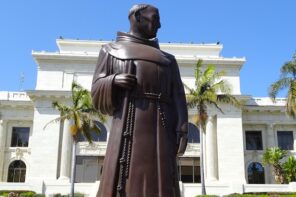One of the big questions at last week’s Republican debate was whether Jeb Bush would follow the lead of his super PAC and attack Marco Rubio as being unelectable in the general election because of his hard-core stance against any exemptions for abortion.
Bush didn’t and his reluctance was put down to his general lack of political attack-dog instincts—as he demonstrated to Huffington Post (somewhat incoherently) when asked if Rubio could win a general election given his abortion position: “Since I don’t have that view, I don’t. Trying to be engaged in something that I’m really not interested in doing, I’ll tell you what my views are, and I have.”
It’s just as likely that Bush’s hesitation to attack Rubio on abortion (and his incoherence in addressing his position) stems from his own incoherence on the issue. Bush, after all, has cast himself as a devoted Catholic convert who was attracted to the church because of its “absolute nature” and “the fact that the Catholic Church believes in, and acts on, absolute truth as its foundational principle and doesn’t move with the tides of modern times.”
And if there’s one thing the Catholic hierarchy is absolute about it’s their absolute prohibition on abortion—even in cases of rape, incest or when the woman’s life is threatened. The Catholic Church teaches that every life is sacrosanct from the “moment of conception” no matter how that conception occurred or what the impact on the woman carrying the baby might be.
Rubio, by contrast, has embraced the position of the Catholic hierarchy, telling CNN that he opposes exemptions for rape and incest:
I believe all human life irrespective of the circumstances in which it came into being is worthy of the protection of our laws. I recognize this is a tough question. It’s a very difficult question. And I understand that. Believe me, I do. But by the same token if I have to weigh the two equities here, I’m always going to err on the side of life.
The fundamental problem with Bush’s abortion position isn’t just that it contradicts the Catholic hierarchy, which puts him in a difficult position as a conservative Catholic. It’s that it doesn’t even comport with his own befuddled logic about what parts of Catholic doctrine are and aren’t relevant in the public square.
Bush said in response to Pope Francis’ climate change encyclical that the pope should keep his nose out of both climate change and economic policy, suggesting that these are “political” issues that don’t fall in the pontiff’s wheelhouse:
I don’t get economic policy from my bishops or my cardinal or my pope. I think religion ought to be about making us better as people and less about things that end up getting in the political realm.
He also said that he doesn’t “go to Mass for economic policy or things in politics.”
At the same time, Bush has cited his faith as the reason for his strong pro-life position, an issue that is most certainly manifested as a “thing” in politics, saying it’s his “deeply held belief” that “the most vulnerable in our society need to be protected. They need to have legal rights.”
So Bush has drawn a (somewhat arbitrary) line between “liberal” political issues like climate change and income inequality, which belong in the public sphere and, therefore, shouldn’t be affected by religious belief, and conservative issues, like abortion and end-of-life care (regarding his intervention with Terri Schiavo), which, although they are equally manifest in the public square, should be guided by religious conviction.
But at the same time, he’s rejected the church’s teaching on what it calls the foundational moral issue, telling the Huffington Post that he supports abortion exemptions because “I’ve thought long and hard about it and in the public square, I think it’s the right place to be.”
But the calculation appears to be completely political, in line with the thinking that candidates who reject abortion exceptions doom themselves with moderate Republican woman in a general election.
After all, Bush calls himself “probably the most pro-life governor in modern times.” As governor of Florida, he signed a bill creating “Choose Life” license plates to fund controversial anti-abortion “pregnancy counseling” centers and intervened in two cases to prevent a mentally disabled rape victim and a 13-year-old girl who was a ward of the state from having abortions. He also signed a parental consent law, a TRAP law placing strict regulation on abortion clinics, and a ban on partial-birth abortion.
Jeb Bush has made it clear that he believes that when it comes to life issues, his faith is his guide. He’s also made it abundantly clear that he has no problem operating politically to impose his views. But he draws the line at embracing the Catholic hierarchy’s absolutist abortion position “in the public square.”
Can this have anything to do with the fact that only about 20 percent of Americans think that abortion should be completely illegal with no exceptions? It’s not that Bush doesn’t have the balls to attack Rubio on abortion; it’s that he doesn’t want to have to justify his own incoherent, unjustifiable position any more than he has to.




